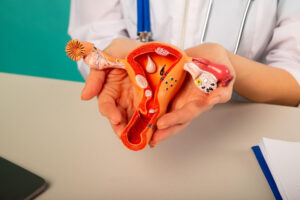Life, as they say, always finds a way. This sentiment is especially true when it comes to conception, a process that is both intricate and miraculous. A common question that arises among hopeful parents is, “Can you get pregnant with just one follicle?, or “Does follicle size for pregnancy matter?”. In this blog, we will dive into the remarkable journey of a single follicle from its initial stages to its potential role in achieving pregnancy, and the role of follicle size in conceiving and unraveling the science behind this important stage of human reproduction.
The Role of Follicles in Conception
Ovarian follicles are small, fluid-filled sacs within the ovaries that contain immature eggs. Each woman is born with a finite number of follicles, which declines significantly over time. By puberty, approximately 300,000 follicles remain, and fewer than 1,000 are left by the time of menopause.
Ovarian follicles are crucial players in the reproductive process. The ovarian follicles are responsible for the maturation and release of eggs during the menstrual cycle, which is vital for reproduction. Each follicle develops through several stages:
- Primordial Follicle: The earliest stage of follicle development, right from birth.
- Primary Follicle: The follicle begins to grow and develop a single layer of granulosa cells.
- Secondary Follicle: The follicle continues to mature with additional layers of granulosa cells and the formation of a fluid-filled cavity.
- Tertiary Follicle: Also known as an antral follicle, it contains a larger fluid-filled cavity and is nearing full maturation.
- Graafian Follicle: The final stage, which is ready to release an egg during ovulation.
The Process of Folliculogenesis
Folliculogenesis is the multi-step process through which ovarian follicles mature. This complex process involves hormonal signaling and cellular changes that prepare the follicle for ovulation. During every menstrual cycle, several follicles begin to mature, but usually, only one becomes the dominant follicle. The dominant follicle is selected based on its size and hormone production, specifically the estrogen.
Folliculogenesis and Ovulation
Folliculogenesis refers to the formation and maturation of ovarian follicles. As a dominant follicle matures, its diameter ranges from 17 to 24 mm. Ovulation occurs when this mature follicle ruptures and releases its egg into the fallopian tube. The egg remains viable for fertilization for about 12 to 24 hours.
Typically, around 10 Graafian follicles start to mature each cycle, but only one becomes dominant. The rest of the follicles will degenerate. The dominant follicle releases estrogen, which thickens the uterine lining, creating an optimal environment for embryo implantation if fertilization occurs.
Factors Influencing Conception
While having a single follicle is entirely sufficient for conception, successful pregnancy depends on several other factors:
- Egg Quality: The health and quality of the egg released by the follicle are crucial. Poor egg quality can hinder fertilization and embryo development.
- Sperm Quality: The sperm must be healthy and viable to fertilize the egg.
- Timing: The timing of intercourse or insemination is critical. The egg must be fertilized within its short viability window.
- Uterine Health: The uterine lining must be adequately prepared to support embryo implantation and growth.
Can You Get Pregnant with Only One Mature Follicle?
When trying to conceive naturally, it’s entirely possible to get pregnant with just one mature follicle. As long as your body can release a mature egg from that follicle, and the egg meets sperm in the fallopian tube, conception may occur. Single follicle pregnancies are quite common for women who are trying to conceive without the help of assisted reproductive technologies—one healthy egg is sufficient to achieve pregnancy.
For those undergoing intrauterine insemination (IUI), having one or two mature follicles is typically ideal, especially for women under 40. Having more follicles does not necessarily enhance the chances of pregnancy.
The Journey from Follicle to Fertilization
Yes, one may indeed get pregnant with just one follicle. The process involves the following steps:
- Follicle Maturation: One follicle matures each cycle, reaching the Graafian stage.
- Ovulation: The mature follicle releases an egg into the fallopian tube.
- Fertilization: The egg remains in the fallopian tube for about 12 to 24 hours, where it can be fertilized by sperm.
The presence of a single dominant follicle can result in pregnancy if all other conditions are favorable. While having multiple follicles can increase the chances of successful conception, it does not guarantee it. Factors such as the quality of the egg, the timing of intercourse or insemination, and the health of the reproductive system all play crucial roles.
Monitoring Follicles
Monitoring ovarian follicles can provide insights into an individual’s fertility status. It helps gauge the number of eggs available and can indicate the likelihood of success with fertility treatments. Follicle monitoring is particularly useful in assisted reproductive technologies like IVF.
The journey from a single follicle to a potential pregnancy is a remarkable testament to human reproduction’s complexities. Yes, you can get pregnant with just one follicle. The presence of a single dominant follicle, if it releases a healthy egg and meets viable sperm, can lead to conception.
While the number of follicles can influence fertility, the overall success of conception depends on multiple factors, including egg and sperm quality, timing, and reproductive health. Conception is a multifaceted process, and even with a single follicle, the potential for a new life remains very much possible. Conceiving a new life is a cherished journey, and Boon IVF is dedicated to guiding you through each step. Reach out to Boon IVF today for a personalized consultation regarding IVF treatment, infertility, or IUI. Let’s address your unique needs, explore financing possibilities, and craft a tailored treatment plan that aligns with your financial goals and brings you closer to realizing your dream of parenthood.


